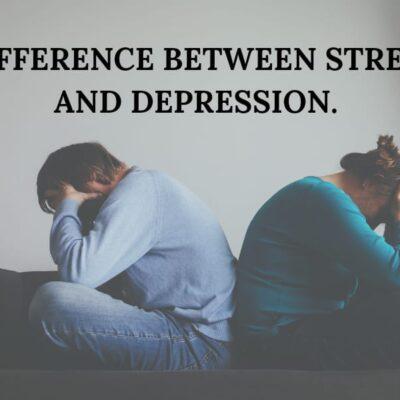Difference between Stress and Depression: Some level of stress is good for you, like the tension you feel when you start a new relationship or job. It can fuel excitement and make you want to achieve more. Stress can also help you be ready to face challenging and dangerous situations.
Good stress doesn’t stick around. It elevates your mood to meet the moment, then goes away. If you are under stress for a long time, it can become overwhelming and affect you both emotionally and physically.
If we stay under chronic stress, our physiological stress reaction is taxed beyond what it is prepared to do, and it starts to harm us.
The effects of long-term, stress can be harmful on their own, but they also can contribute to depression, a mood disorder that makes you feel miserable and disinterested in things you usually enjoy. On the other hand, depression can affect your appetite, your sleep habits, and your ability to focus.
And the consequences of depression can cause stress.
The Stress-Depression Connection
The causal relationship between depression and stress is called bidirectional. One can cause the other, and both can make each other worse.
The ways depression can direct stress are pretty clear.
Depression disrupts your life, so you often want to stay in isolation. Sometimes you squeeze your interpersonal network and stop doing a lot of activities, like work or things that you enjoy. We know that kind of separateness makes your perceived stress level go up, so we know that depression can cause stress.
Also Read: Stress Management.
Common signs of stress
Stress is a standard part of life. A little bit of stress is beneficial and motivating, but too much stress may lead to high blood pressure (BP), weight gain, and even heart disease. There are ways your body tells you when you are experiencing too much stress. Some of the warning signs include:
- Inability to focus or complete tasks
- Trouble asleep
- Memory troubles
- A shift in eating habits
- Feeling mad or irritable
- Having trouble performing at work
- Getting ill often
- Frequent headaches and body aches
Common signs of depression
Depression is a mental health condition that interferes with a person’s ability to carry out day-to-day functions. It’s denoted by feelings of sadness and a loss of interest in earlier enjoyable activities. A depression diagnosis is given once a person experiences a depressed mood and a majority of the following symptoms for at least two weeks.
- Feeling sad and useless
- Isolating from other people
- Loss of interest in activities
- Anger
- Eating less or more than usual
- Sleeping less or more than usual
- Lack of energy and inspiration
- Feeling restless, agitated, and irritable
- Suicidal thoughts
What is the difference between stress and depression?
Stress is not a mental health illness. It tends to have an evident trigger, like a divorce, or illness. Stress typically determines as life events change. However, stress can lead to mental health problems like tension and depression if it continues over long periods without relief.
Depression, on the other hand, is a mental health condition that requires a medical diagnosis.



